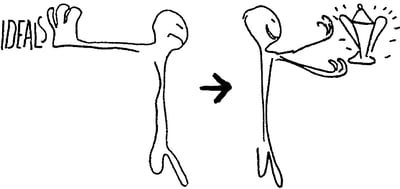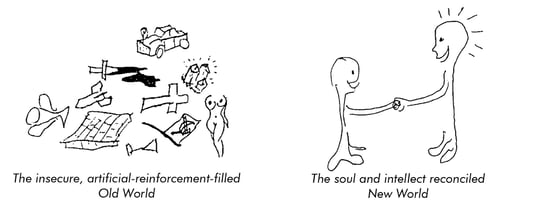Everyone has something to offer
One of the things I love most about having and living with Jeremy Griffith’s biological explanation of the human condition is that regardless of who you are or where you are from, you can live the most meaningful and in fact exhilarating life imaginable by contributing to saving the world as we all dreamed of spending our lives doing when we were children. Honestly, one minute you are a mouse running in the wheel of life, pacing endlessly in the dark towards a future of who knows what—the next you can understand yourself, others and everything that is going on around the planet, how it all fits together, why it all is as it is and importantly where the world and the human race needs to go. My story is just one human story but I think it makes the point wonderfully of how understanding the human condition transforms your life and can therefore transform the world.
I am just an average person from a pretty normal part of the world on the east coast of Australia, however I have an illness called epilepsy, that absorbs large amounts of my time in its management and puts some sizable limitations on the amount of functionality and energy I have to participate in society. Nearly 25 years of having seizures and taking a lot of medicine to try and control them has had a pretty serious effect on my memory, general health, leaves me extremely tired and prevents me from driving. My situation is obviously a little more extreme than most, but I’m sure everyone can relate to having frailties and limitations and the difficulties encountered living with and accepting them.
I know my situation probably doesn’t sound very promising or inspiring, and I wouldn’t be surprised if you are wondering how a person like that could become particularly ‘helpful’ at anything, because it was certainly a question I used to ask myself a lot, before I absorbed just how transforming understanding the human condition can be.
With hindsight I can clearly see that epilepsy really isn’t my primary problem at all, even though it was the thing that consumed my thoughts the most. Sure, it’s a huge problem for me and one that takes a great deal of management, but it was the time wasted in denying that I had it, hating the effects and feeling sorry for myself that was really so crippling for me. But really those feelings are all tied into my primary problem which is that like just about everybody else on planet Earth, underneath what talent, bravado and personality I have, I am a human, deeply insecure, human-condition-afflicted, entirely preoccupied with self-worth and with getting some kind of positive reinforcement to escape from my reality—simplistically associating what I could and couldn’t do with whether I was a good or bad person. It was that preoccupation that left me very dysfunctional and seemingly unhelpful, not my epilepsy.
Like all humans growing up in a world without explanation of the human condition, there came a time where I made an adjustment from a child’s beautiful, idealistic, caring, instinctive world, and ‘resigned’ (read Jeremy Griffiths full explanation of Resignation here) myself to the competitive, egocentric, selfish reality we live in. We all develop strategies depending on what talents and abilities we have, to try and get as much reinforcement as we can. All we really want is just relief from our particular version of the human condition. And that is where we all spend the rest of our lives living under the duress of the human condition. Little did I know about the excitement, happiness and relief that was just around the corner. It was the ‘Stirling, this explanation applies to you personally too’ corner.

The truth is, when you first access the explanation of the human condition, it’s relatively easy to hear and accept the truth about the world around us—how upset and egocentric and alienated everybody else is—and it’s incredibly exciting and interesting to have finally found explanation of how and why the world works the way it does. But when it comes to looking at yourself with the same honesty (albeit completely compassionate, liberating honesty) the initial way we respond to the truth is the way we have always done, which is to deny and ignore it out of our lives, because the compassionate truth also confronts us with its acknowledgement of our immense upset.
It makes sense to me that I couldn’t initially relate the human condition to my own condition because this understanding does present a very real and very big paradigm shift. So, even though I had known, from my first reading of Jeremy’s book Beyond The Human Condition, that this explanation was true and did finally get to the bottom of all the problems on the planet, and even though I had used that explanation to compassionately explain the world and all the mess within it, I didn’t initially allow its compassionate, transforming effects to look after my own human-condition-afflicted, messed-up, insecure, egocentric life. But the amazing thing is that when I did, the effect was incredible. It truly was a life changing moment for me and I’ll never forget the lightness I felt when I applied the defence of human upset to my own upset. I realised that I could accept that I am a good person, that I’m a wreck as a result of the human condition and that my strategy for coping without an explanation of the human condition is now redundant because the human condition has been explained. Feelings of frustration, anxiety, or insecurity, don’t have to control or own me ever again. The personal validation that I was desperately trying to impossibly achieve, through an artificial, futile, hopeless strategy, has truly been found. No more wasted time and energy being frustrated by and feeling sorrowful about having epilepsy but rather a peace of mind that can only come from a deep understanding of my and humanity’s fundamental goodness and an awareness that my and humanity’s future is one that is full of promise and freedom from the human condition.
From this far more honest and less preoccupied position I’m able to do things that are realistic and as a result helpful. I can happily do things that my ego would have stopped me from doing in the past because they didn’t draw enough attention or ‘glory’. It allows me to be able to accept my limitations and live with a humbleness that gives me access to the meaning, happiness and excitement that any job has when you’re supporting something so meaningful and helping to fix the world.

Every day that I use this information I’m being ‘helpful’. I’m not trapped in a dysfunctional strategy. I couldn’t do that while I was endlessly preoccupied with my epilepsy and trying to prove myself. Your strategy isn’t helping you or anyone else now the human condition is solved.
I can only suggest that once you have satisfied yourself that these explanations of humans are true, which everybody needs to do, try asking yourself: ‘If these explanations liberate and transform the whole human race, does that apply to me too?’ And then ask: ‘Am I allowing these explanations to liberate and transform my life?’ Honestly, if you apply them to your life then you’ll be as happy as I am and you’ll have the opportunity to contribute to making these explanations available to a full generation of children that will never have to know the pain, insecurity and desperation that we have all grown up with.
As long as we support the explanation that explains why all these problems exist in us all then we can fully participate in saving the world and living the most meaningful, helpful and in fact glorious life that is possible.




Please wait while the comments load...
Comments